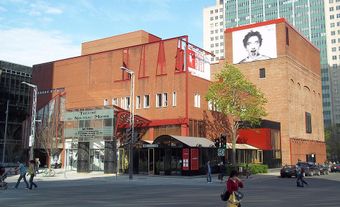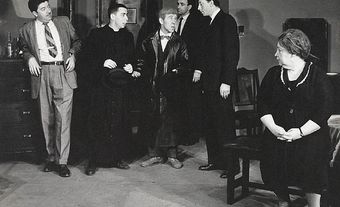Élise Guilbault, actress (born 7 April 1961 in Saint-Lin-des-Laurentides, Québec). Soon after graduating from the National Theatre School of Canada in 1985, Élise Guilbault made her debut at the National Arts Centre in L'Année de la grosse tempête, a play written by André Ricard and directed by André Brassard, with whom she was to develop a lasting professional partnership, appearing in some ten of his productions. In 1987, he cast her as Leïla in Les Paravents, by Jean Genet (a joint production of the National Arts Centre and Montréal’s Théâtre du Nouveau Monde). Her intense performance in this role led to her discovery both by audiences and by the critics. In 1988, her strong yet nuanced performances in two roles at the Théâtre du Nouveau Monde marked her as a young actress to watch. The first was as Helena, in a French-language production of Shakespeare’s Midsummer Night’s Dream, directed by Robert Lepage; the second was as Queen Marie in Ionesco’s Le Roi se meurt (Exit the King), directed by Jean-Pierre Ronfard.
Guilbault has explored many dramatic registers in the course of her career. She is just at ease with classic French tragedy (Racine’s Andromaque, Théâtre du Nouveau Monde, 1994) as with the modern plays of Michel Tremblay. She played Victoire in Tremblay’s La Maison suspendue (Compagnie Jean-Duceppe, 1990); Carmen in his Sainte-Carmen de la Main, part of his Brassard trilogy (Théâtre d'Aujourd'hui, 1991); and the bitter Albertine at age 40 in Albertine, en cinq temps (Espace GO, 1995). This last play, directed by Martine Beaulne, was a huge success, was revived a number of times, and toured Québec in 1997 and Europe in 2001. Guilbault is indebted to Martine Beaulne for two other milestones in her career: Cinq Nôs modernes, by Yukio Mishima (Théâtre du Rideau Vert, 1992) and Marina, le dernier rose aux joues, by Michèle Magny, in which Guilbault played the Russian poet Marina Tsvetaeva (Théâtre d'Aujourd'hui, 1993). At Montréal’s Théâtre de Quat'Sous, Guilbault has appeared in plays by Serge Boucher (Natures mortes, 1993), Brad Fraser (Des restes humains non identifiés et la véritable nature de l'amour, 1991), David Ives (Variations sur un temps, 1996), David Mamet (Le Cryptogramme, 1996) and Ruth Wolff (L'Abdication, 1998), the last two directed by her sister, Denise Guilbault.
Film has offered Guilbault a few roles worthy of her talents. Her performance in Cap Tourmente, by Michel Langlois (1992), earned her the Guy-L'Écuyer Award from the Québec film festival Les Rendez-vous du cinéma québécois. Bernard Émond, in particular, has cast her as leading characters with deep inner lives in two films. For her performance in the first, La Femme qui boit (2000), she won no fewer than three acting awards: the Bayard d'or at the Namur Film Festival, a Jutra, and a Genie. For her poignant performance in La Neuvaine (2005), as a women suffering from severe depression, she received a Jutra Award.
On television, Élise Guilbault has become an audience favourite for the colourful characters she portrays, such as the passionate artist Emma in the drama series of the same name, for which she won three MetroStar awards and a Gemini Award. She has displayed genuine comic talent in Détect.inc by Claude Meunier, as well as in Le cœur a ses raisons by Marc Brunet, Un gars, une fille by Guy A. Lepage, and Les Hauts et les Bas de Sophie Paquin, in which her performance as Estelle Poliquin, a histrionic actress, earned her a Gemini Award. Her other notable dramatic roles have included Les Bâtisseurs d'eau and Deux frères (Gemini Award, 1997).

 Share on Facebook
Share on Facebook Share on X
Share on X Share by Email
Share by Email Share on Google Classroom
Share on Google Classroom


